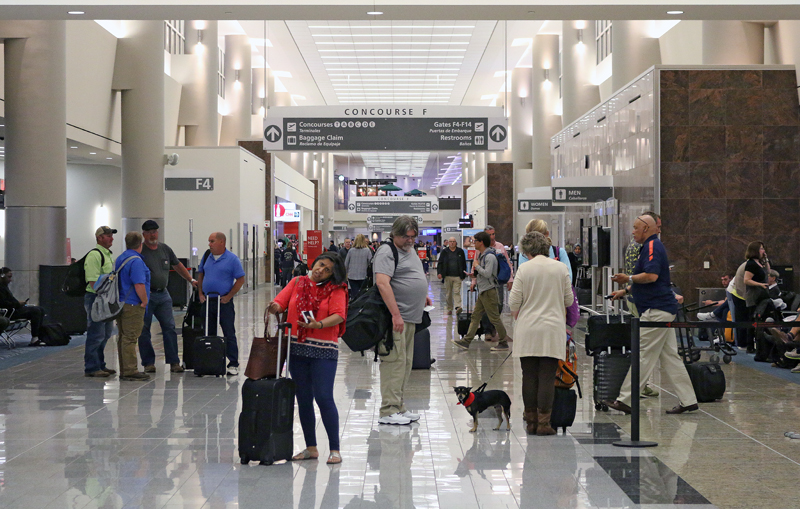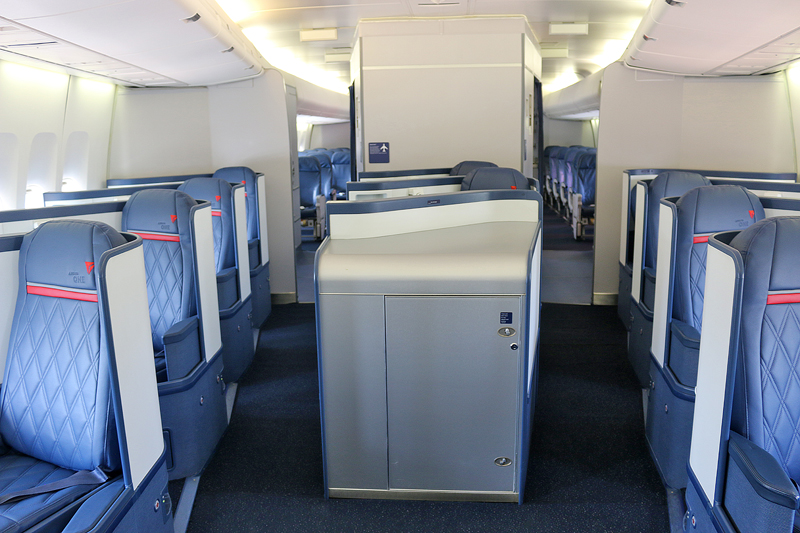Imagine that you have settled into your seat in the business class cabin after boarding the airplane. A member of the flight crew serves you your pre-departure beverage as you relax with plenty of leg room with which to stretch…
Not One, But TWO Huge Emotional Support Dogs In the Same Row in Business Class
…until not one, but two huge dogs park into your row and consume much of that space.
Also imagine having a big dog looking over your shoulder as you are trying to enjoy your meal.
That reportedly happened aboard an airplane operated by Delta Air Lines recently; and Eric@GoldboxATL posted two photographs to his official Twitter account.
https://twitter.com/GoldboxATL/status/1195406008459440128
Legitimate service dogs are trained to behave properly, not be disruptive, and follow the commands of their owners while aboard an airplane. They typically do not wear harnesses labeled with the words service dog. Anyone can purchase one via the Internet without having to do anything else.
https://twitter.com/LongridgeBloke/status/1195443049431744513
Whether or not each dog had a different owner has not been revealed.
https://twitter.com/j2simpso/status/1195860690449371140
The origination and destination airports of the flight have not been revealed, but the duration of the flight had to have been fewer than eight hours because all emotional support animals are banned on any airplanes operated by Delta Air Lines whose flights are greater than eight hours in duration effective as of Friday, February 1, 2019; and passengers are not permitted to originate travel on any flight operated by Delta Air Lines — regardless of the length of the flight — with any service animal or emotional support animal which is younger than four months of age.
Other airlines have followed suit with similar restrictions on emotional support animals.
Delta Air Lines has led the way in recent years in applying stricter restrictions pertaining to passengers traveling with emotional support animals. Effective as of Tuesday, March 1, 2018, Delta Air Lines requires that all passengers traveling with service dogs, psychiatric service animals or emotional support animals provide documentation of proof of health or vaccinations 48 hours in advance of the departure of a flight. The airline has added enhancements to the stricter requirements, as passengers who are traveling with:
- A trained service animal are required to submit a signed Veterinary Health Form and/or an immunization record — current within one year of the travel date — for their animal to the Service Animal Support Desk of Delta Air Lines via Delta.com at least 48 hours in advance of travel; and these customers can check-in via Delta.com, the Fly Delta mobile software application program, airport kiosks, or with an airport agent.
- An emotional support animal or psychiatric service animal are required to submit a signed Veterinary Health Form and/or an immunization record — current within one year of the travel date — an Emotional Support/Psychiatric Service Animal Request form which requires a letter prepared and signed by a doctor or licensed mental health professional, and a signed Confirmation of Animal Training form to Service Animal Support Desk of Delta Air Lines via Delta.com at least 48 hours in advance of travel; and these customers must use the full-service check-in process with an airport agent.

A Reminder of the Definitions of Service Dogs and Emotional Support Animals
The official definition of a service animal — according to the Disability Rights Section of the Civil Rights Division of the Department of Justice of the United States pertaining to the Americans with Disabilities Act, or ADA — is as follows:
Service animals are defined as dogs that are individually trained to do work or perform tasks for people with disabilities. Examples of such work or tasks include guiding people who are blind, alerting people who are deaf, pulling a wheelchair, alerting and protecting a person who is having a seizure, reminding a person with mental illness to take prescribed medications, calming a person with Post Traumatic Stress Disorder (PTSD) during an anxiety attack, or performing other duties. Service animals are working animals, not pets. The work or task a dog has been trained to provide must be directly related to the person’s disability. Dogs whose sole function is to provide comfort or emotional support do not qualify as service animals under the ADA.
This definition does not affect or limit the broader definition of “assistance animal” under the Fair Housing Act or the broader definition of “service animal” under the Air Carrier Access Act.
Some State and local laws also define service animal more broadly than the ADA does. Information about such laws can be obtained from the State attorney general’s office.
Additionally, service animals must be harnessed, leashed, or tethered — unless these devices interfere with the intended work of the service animal or the disability of the individual prevents using these devices. In that case, the individual must maintain control of the animal through voice, signal, or other effective controls.
An emotional support animal is a companion animal which provides therapeutic benefit to an individual designated with a disability — such as depression, bipolar disorder, panic attacks or anxiety as only a few of many examples. While only dogs — and, in a separate provision which need not be discussed here, miniature horses — can be officially designated as service animals, emotional support animals can also be cats and other animals as prescribed by a physician or other medical professional if the owner of the animal has a verifiable disability in accordance with federal law of the United States.
In order to prevent discrimination by commercial airlines — based both within and outside of the United States — against passengers on the basis of physical or mental disability, the Air Carrier Access Act was passed by the Congress of the United States in 1986; and here are where complaints may be registered against an airline via the official Internet web site of the Aviation Consumer Protection and Enforcement division of the Department of Transportation of the United States.
Employees of airlines are limited by law to the questions they are permitted to ask owners of animals brought aboard airplanes. Only two questions may be asked by employees of an airline — or of any other company, for that matter pertaining to service animals…
- Is the dog a service animal required because of a disability?
- What work or task has the dog been trained to perform?

…and when the service an animal provides is not obvious, an employee of an airline or other company cannot do the following actions without violating federal law:
- Ask about the nature of the disability of the person
- Require medical documentation
- Require a special identification card or training documentation for the dog; or
- Ask that the dog demonstrate its ability to perform the work or task
Official Policies of Airlines in the United States and Canada
A commercial airline is permitted to require a passenger traveling with an emotional support animal provide written documentation that the animal is an emotional support animal — unlike for a service animal. A fee does not apply to service animals of passengers with disabilities — not even on airlines such as Spirit Airlines and Allegiant Air, which are known for their proliferation of ancillary fees.
Here is a list of airlines with links to their official policies pertaining to animals:
- Air Canada
- Alaska Airlines
- Allegiant Air
- American Airlines
- Delta Air Lines
- First Air
- Frontier Airlines
- Hawaiian Airlines
- JetBlue Airways
- Porter Airlines
- Southwest Airlines
- Spirit Airlines
- Sun Country Airlines
- United Airlines
- WestJet Airways
Summary
Perhaps Delta Air Lines — and other airlines, for that matter — should consider placing further restrictions on emotional support animals in terms of size and quantity as a result of this specific situation. When a fellow passenger redeems a substantial amount of frequent flier loyalty program miles — or a significant amount of money — to sit in a premium class seat aboard an airplane, that person should not have the comfort for which he or she paid compromised. This is especially true for passengers who suffer from being allergic to dogs.
Furthermore, companies which sell harnesses, vests and other garments and tools used for emotional support animals should be required by law to accept official proof from customers that the need to purchase any of these items is legitimate.
The situation could have been worse, I suppose. Imagine if these same dogs were somehow shoehorned into the same row of seats in the economy class cabin aboard the airplane.
I have written extensively over the years pertaining to service dogs and emotional support animals in the form of articles posted here at The Gate — including:
- Final Statement on Emotional Support Animals Aboard Airplanes Issued by Department of Transportation of the United States
- Flight Attendant Bitten by Emotional Support Dog
- Man Bitten By Emotional Support Animal Sues Airline For Damages
- Emotional Support Animals Banned on Long-Haul United Flights — And…
- Emotional Support Animals Banned on Long-Haul Delta Flights — And…
- Stricter Requirements for Emotional Support Animals By Southwest Airlines
- Stricter Requirements for Emotional Support Animals By JetBlue Airways
- Stricter Requirements for Emotional Support Animals By American Airlines
- Passengers To Be Limited to One Emotional Support Animal on Delta Air Lines
- Stricter Requirements for Emotional Support Animals By Alaska Airlines
- Stricter Requirements for Emotional Support Animals By United Airlines
- Enhancements Added to Stricter Requirements for Emotional Support Animals and Service Dogs By Delta Air Lines
- Stricter Requirements for Emotional Support Animals and Service Dogs By Delta Air Lines
- In Defense of Emotional Support Animals? Not Exactly
- Forget Hamsters. How About True Emotional Support From an Airline?
- Can an Emotional Support Animal Be Used as a Threat?
- Why It is NOT Time to Ban Emotional Support Animals From Airplanes
- Confession by Pet Owner: “Emotional Support Dogs” are “B.S.”
- Emotional Support Animals: More Evidence of Faking
- Support Animals Versus Allergies: Here We Go Again
- Woman Forcibly Removed From Airplane Reignites Support Animals Versus Allergy Debate
- Service Animals or Emotional Support Animals: A Pig Continues The Debate
- Service Dog Denied Permission to Board an Airplane? Yeah — When Pigs Fly! Oh, Wait a Minute…
- When Pigs Fly: Somebody Tell The Sun That This is 2017
- Passengers Applaud as Boy Allergic to Dog is Removed From Airplane
- Update: Misinterpretation of Applause From Passengers Over Allergic Boy? What Really Matters is…
- Service Animals: Your Comments Requested by the Department of Transportation
- Delta Air Lines to No Longer Accept Pets as Checked Baggage
- Service Dog Denied Permission to Board an Airplane? Yeah — When Pigs Fly! Oh, Wait a Minute…
- Video: Woman Escorted Off the Airplane By Police Because of Her Unruly Dog
- Can Orphaned Parrots, Crows and Ravens Qualify as Service Animals?
- Service Animals Bill: Could a Legal Decision Arrive in Florida as Soon as Tomorrow?
- Service Animals Bill Unanimously Passes in Florida Today; To Become Law on July 1, 2015
- Court Rejects Ruling of Air Canada Separating Dogs From Allergic Passengers
- Dog Days in Flight, and How to Avoid Paying a Fee for Your Dog
All photographs ©2013, ©2016 and ©2017 by Brian Cohen.

